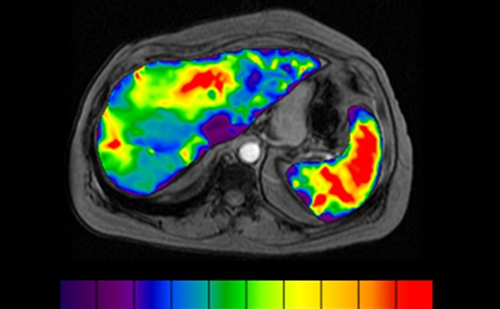11 November 2014. Takada Pharmaceutical Company and GE Healthcare are collaborating on research into scarring of liver tissue that happens when damage occurs, often from fat building up in the liver, an increasingly common condition. Financial terms of the partnership, announced today at a meeting of American Association for the Study of Liver Diseases in Boston, were not disclosed.
The scarring of liver tissue, known as hepatic fibrosis, takes place when excessive connective tissue develops in response to injury. The build-up of scar tissue disrupts blood flow in the liver or even its functioning, and can lead to liver failure. The condition has almost no visible symptoms until it becomes severe, which makes it difficult to detect and treat in its early stages.
Cirrhosis, where liver functions are impeded, can result from alcohol abuse, but also non-alcoholic fatty liver disease, where fat accumulates in the liver and in some cases can lead to inflammation and damage. Aging of populations worldwide, along with more unhealthy lifestyles are believed to be contributing these conditions. The companies cite statistics showing the number of non-alcoholic fatty liver disease cases doubled in the past 20 years, while other liver disorders are remaining stable in number or declining.
Because liver disorders often have no discernible symptoms until they reach a critical stage, early diagnosis and treatment are important to controlling or reversing their progression. In their collaboration, GE Healthcare will provide Takada access to its magnetic resonance technology that uses acoustic waves to prepare an image called an elastrogram, depicting tissue stiffness of the liver. GE says the non-invasive device called MR Touch, developed with the Mayo Clinic, can return an image in as little as 14 seconds, and reduces the need for liver biopsies, the alternative diagnostic technique.
Access to GE Healthcare’s technology is expected to help Takada ease the burden on patients in tests of its drug candidates to control or reverse hepatic fibrosis. The company, based in Osaka, Japan, has no current development programs specifically targeting liver diseases, but is testing several candidates for obesity, diabetes, gastrointestinal disorders, and solid tumor cancers.
Read more:
- High-Speed Artery Imaging Technology in Development
- Graphene Sensor Offers Clear Optical Access to Brain Cells
- Robot for MRI-Guided Epilepsy Surgery in Development
- Smart Bandage Monitors Severe Wound Healing
- Chip Emulates Human Airway Muscles to Test Asthma Treatments
* * *


 RSS - Posts
RSS - Posts
You must be logged in to post a comment.